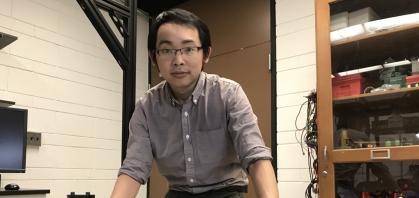Physicist Xuejian Wu Is Breaking New Ground with Atomic Sensors Used for Navigation

Assistant Professor Xuejian Wu, who joined Rutgers University–Newark’s Physics department last spring, will work with Dr. Malo Cadoret at Conservatoire National des Arts et Métiers, in France, to build the next generation of quantum (atomic) sensors for inertial navigation, a type of navigation that is important for aircraft, spacecraft, satellites, submarines and ships when Global Positioning Satellite (GPS) signals are inaccessible.
Sensors have long been used by scientists, engineers and geologists to measure gravitational fields in and around objects. In geophysics, researchers use these precise instruments to measure gravity data and test for the presence of underground water or study underground lava activity near a volcano before an eruption, for instance. Physicists and engineers also use them underwater and in space.
Scientists primarily have used what are called classical sensors for these jobs, where a spring pulls on an object when gravitational or rotational force is applied, and the spring is measured before and after to assess the amount of the force. These instruments are compact and easy to use, but they’re sensitive to temperature and humidity, not accurate, and need to be calibrated before and after each usage, according to Wu.
About two decades ago, scientists started developing sensors using atoms and lasers, with the atoms as objects and lasers in place of springs. They're more complicated to build, requiring laser and electronic control systems, but they’re very precise without the other drawbacks of classical sensors, and researchers have been working to make them more compact, robust and mobile so they can perform well out in the field and on drones, submarines and other objects underwater and in space.
For years, Wu and Cadoret have been coming at this challenge from different angles, using varied techniques and technologies. Their collaboration will enable them to join forces and combine their research to push forward the development of these all-important instruments.
“Dr. Cadoret is a world-leading expert on quantum inertial sensors, and I’m looking forward to our teams working together,” said Wu.
Wu, who is a native of China, worked as a postdoctoral scholar in the Department of Physics at the University of California, Berkeley from January 2015 to December 2020 before arriving at Rutgers-Newark. While there, he helped build a mobile quantum sensor for precisely surveying gravity in hills around Berkeley and estimating the density of the underground rocks there.
Cadoret, meanwhile, has been developing a quantum sensor for use on water and in air using a method called Bloch oscillation to coherently manipulate atoms with large photon momentum and thus increase their sensitivity. His team has deployed their instrument on ships for marine gravity surveys, as well as on aircraft for airborne surveys.
Wu is able to do this work in part thanks to a competitive Rutgers Global International Collaborative Research grant. The grant will support travel between the two groups, enabling Wu and Cadoret to work together, and their doctoral students to visit each other’s lab and learn about the new quantum technology and methodologies. The Rutgers Global grant will also help Wu attract other external funding for his work.
“I’m grateful to Rutgers. People have been talking about atomic sensors for a very long time and describing their applications, but only a few have been developed applied to these applications,” said Wu. “It’s about time for this to happen, especially with advancements in laser and other technologies. We have the ability to do this finally.”
Adapted from an article published by Rutgers School of Arts & Sciences-Newark



